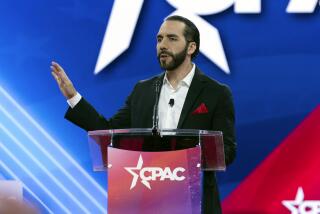Kabila Signals Readiness for Dialogue in U.N. Speech
- Share via
UNITED NATIONS — Congo’s President Joseph Kabila told the United Nations on Friday he was willing to begin a dialogue with his military and political enemies and urged them to reciprocate “without reservations.”
“We want to bring together all the Congolese while at the same time respecting differences among them,” Kabila said, referring to military and civilian opponents.
Addressing the U.N. Security Council, Kabila appealed to the United Nations for a speedy deployment of a peacekeeping force and said his country would put no obstacles in the way of the U.N. troops helping to end what has been called Africa’s first world war.
He also said he needed U.N. assistance to plan “free and transparent” elections but gave no date. However, Kabila said polls would only take place once the Rwandan and Ugandan “aggressors” left the Democratic Republic of Congo.
Kabila, 29, took office last month following the assassination of his father, Laurent Kabila, who refused to negotiate with rebels or with Ketumile Masire of Botswana, chosen as a mediator by African leaders.
Kabila told reporters that an investigation into his father’s murder should be completed within three weeks.
Rwanda and Uganda, which helped put the elder Kabila in power in 1997, turned on him a year later and backed rebels trying to topple him. Zimbabwe, Namibia and Angola then sent in soldiers to bolster the ragged Congolese army.
When asked if would accept Masire as mediator, Kabila told reporters that the Congolese could have a dialogue without him. But if Masire was needed, one would have to resolve earlier disputes first. The elder Kabila had accused Masire, a former Botswanan president, of partiality.
“We reiterate our urgent appeal to all political actors as well as members of the civil society to join without reservations,” Kabila said, speaking in French and English.
U.N. Secretary-General Kofi Annan told the council there had hardly been any cease-fire violations over the last two weeks. “The time appears right for a resolute effort to implement the [peace] agreement and to start a genuine dialogue among all Congolese on the future of their country,” he said.
Echoing Annan, British ambassador Jeremy Greenstock told Kabila: “You have the most important role to play, sir, not just in moving forward dialogue among the Congolese parties to the conflict but, much more generally, in creating an atmosphere that will allow truly open and representative dialogue to flourish.”
U.S. ambassador James Cunningham said the United States supports the U.N. peacekeeping mission but only after foreign troops begin to withdraw from front-line positions and when Annan decides security conditions are safe enough.
The United Nations has only sent about 200 observers of a planned 5,537-member mission authorized by the council to monitor withdrawals in the vast Central African nation.
Kabila met Secretary of State Colin Powell on Thursday as well as Rwandan President Paul Kagame, his key adversary. Annan welcomed the latter meeting.
Rwandan troops, who occupy eastern Congo, say they have to secure their borders against incursions from exiled ethnic Hutu fighters. Many fled Rwanda after the 1994 genocide that ended with the minority Tutsis in power.
Kabila said at his news conference he understood why Rwanda had security concerns but wondered why Uganda felt it had to intervene in Congo. Rwanda’s problem, he said, should be solved by the international community, which had failed the country during the horrific events of 1994.
The combatants signed a cease-fire accord in Lusaka, Zambia, in mid-1999 that called for foreign armies to withdraw and for the Kinshasa government to open a dialogue with its domestic and political adversaries.
Kabila said the accords had to be looked at again as they called for deployment of U.N. troops throughout the country, which has not yet happened.
U.N. spokesman Fred Eckhard said the world body had had difficulty in sending troops to government areas as well as administrative obstacles. But Kabila told the Security Council the difficulties no longer remain.
More to Read
Sign up for Essential California
The most important California stories and recommendations in your inbox every morning.
You may occasionally receive promotional content from the Los Angeles Times.













